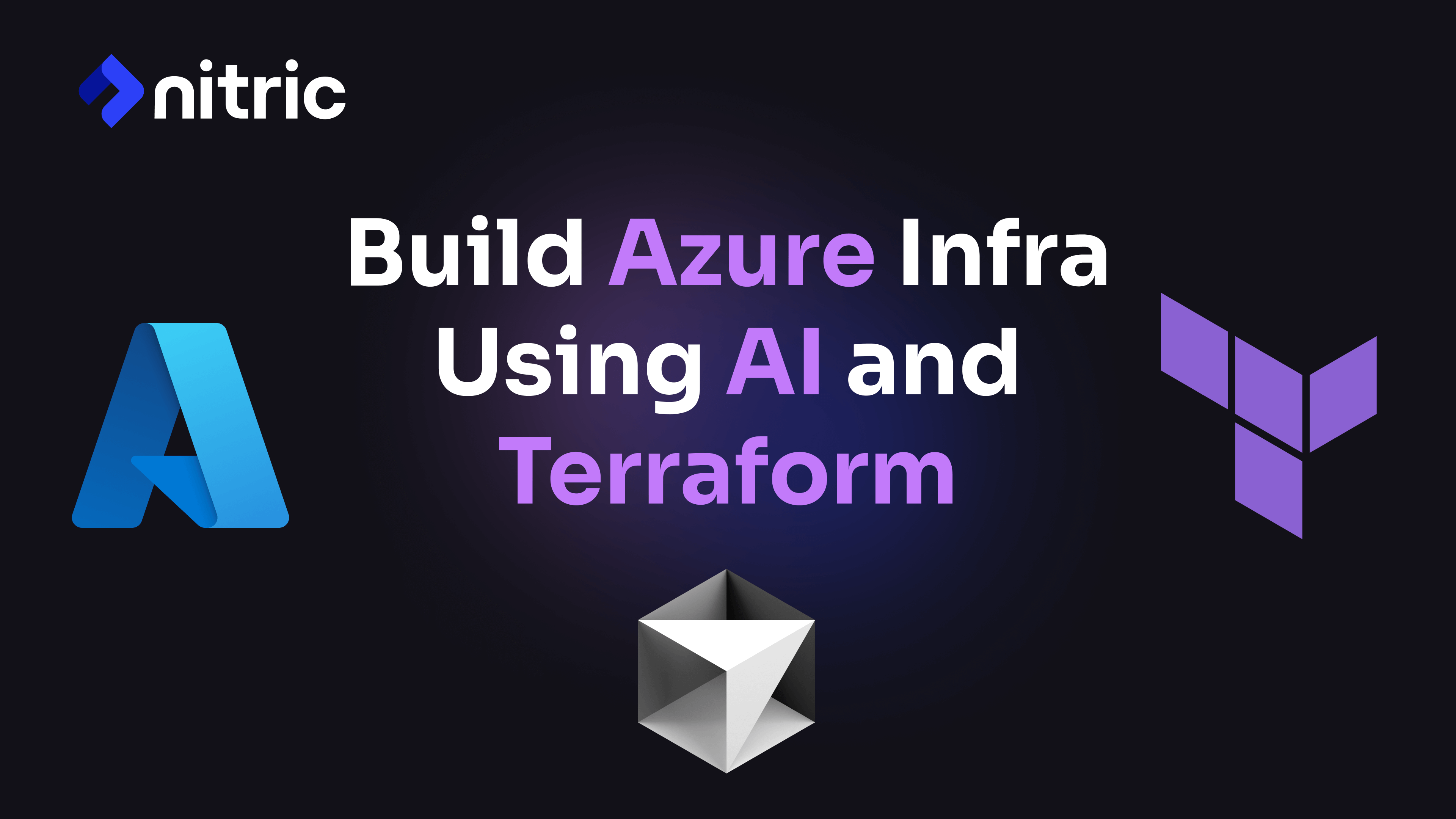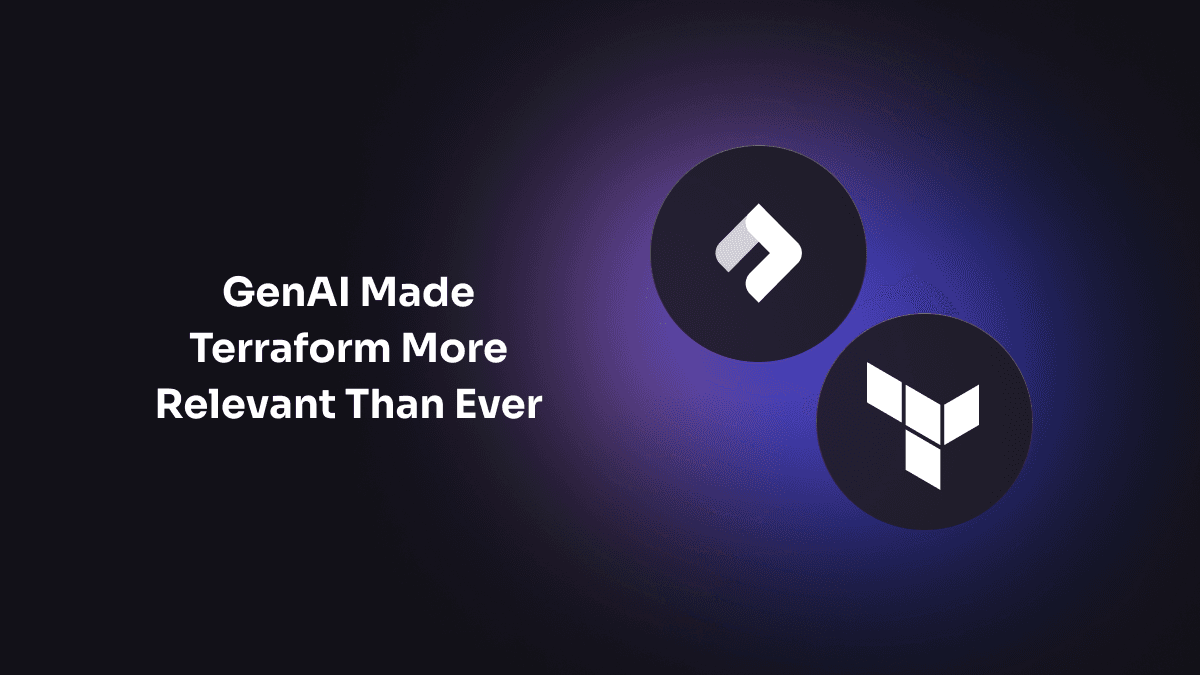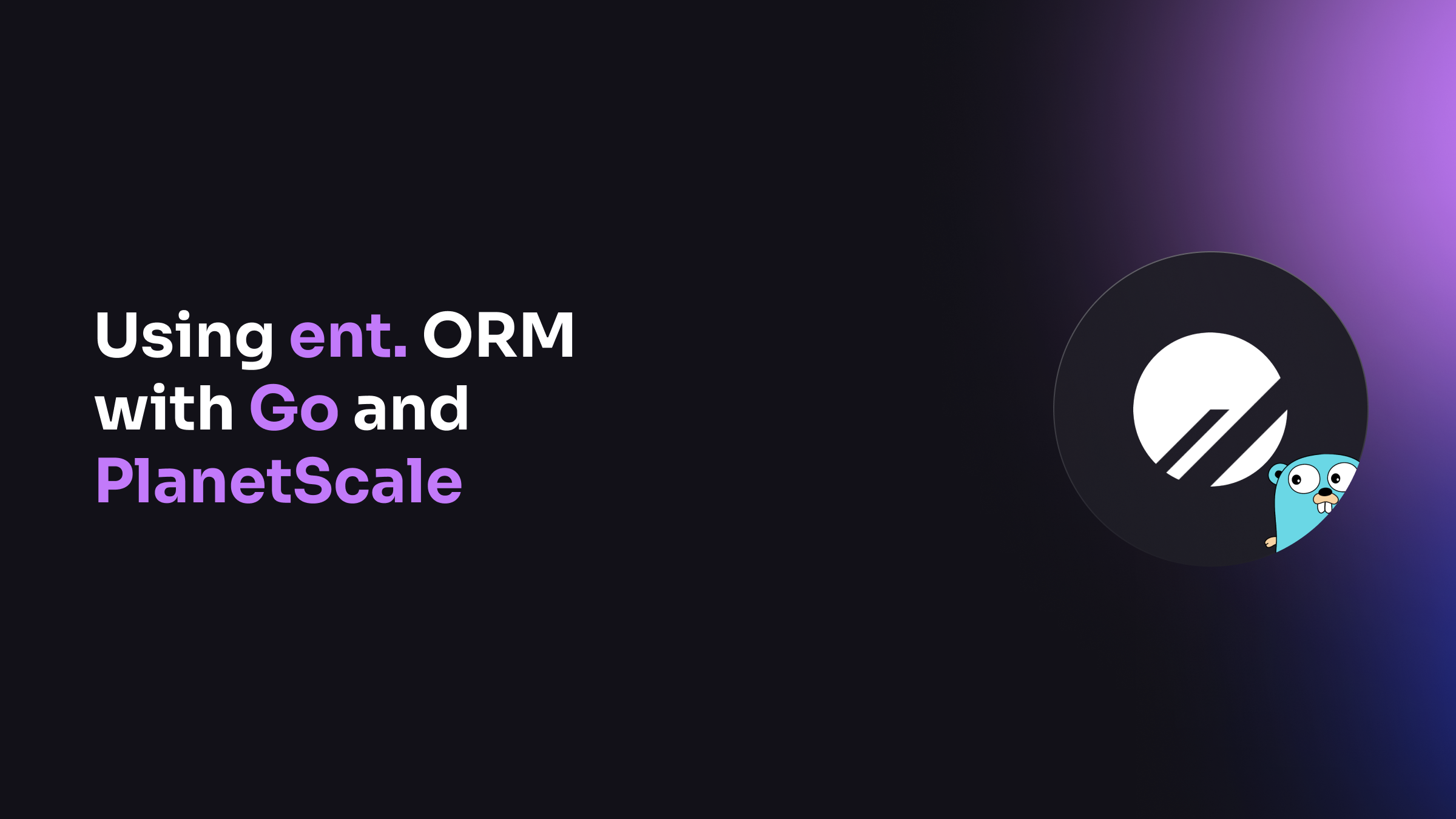Discussion
Why use ent. with PlanetScale?
ent. is an ORM for Go that provides a typed API to your DB schema. We previously used GORM and while it's a good option, we found ourselves searching for an alternative with stronger typing support and controlled schema migrations.
PlanetScale is a powerful serverless MySQL-compatible database that's super easy to set up and has a great free tier. It also provides other interesting features, like schema branching and merging, which we won't be discussing in this guide.
Why use an ORM with type checking?
With GORM queries typically look like this db.Where("name = ?", name).Find(&user). Since the queries use strings to define elements such as field names they can be prone to spelling mistakes/copy-paste errors, meaning testing and debugging are needed to resolve these issues when they occur.
By comparison, the equivalent in ent is db.User.Query().Where(user.NameEQ(name)).First(context.TODO()). As you can see, this query provides far stronger type safety due to the availability of functions such as user.NameEQ().
In our experience, this reduces the chance of errors and catches many errors before or during compile time.
To use versioned migrations or PlanetScale schema merges?
Currently, we don't use PlanetScale's schema merges, although we are exploring it. In the meantime, we're using versioned migrations. The thinking behind this is that we'll need versioned migrations in our dev branch regardless, so it's a good place to start.
Another question we have is what happens in the time between upgrading the software deployment and upgrading the schema? If you do the schema upgrade first, and the old app uses the newer schema you might get failures. If you do the deployment first then you will have a period where the old schema is still in use. In both of these cases, your app needs to be either forward or backward schema compatible.
We are currently running the schema upgrade within our app, so this is happening exactly when it is required. This provides the benefit of not needing schema compatibility. However, it also comes with the risk of causing downtime if the schema upgrade fails, so it's something we'll change in time.
Let's get coding
In this guide, we'll build a simple command-line application that interacts with a PlanetScale database using ent as an ORM. The steps we are going to take are:
- Create a repo
- Perform a basic setup of ent
- Add a migration
- Setup a PlanetScale DB
- Run our app
Prerequisites
- Go
- A free PlanetScale account
- PlanetScale CLI — You can also follow this tutorial in the PlanetScale admin dashboard, but the CLI will make setup quicker.
Setup the base project
cd $GOPATH/src/github.com/<ghuser>mkdir entgo-planetscalecd entgo-planetscalego mod init github.com/<ghuser>/entgo-planetscale
Use ent to create some entities
go install entgo.io/ent/cmd/entent init User
Change to versioned migrations
--- a/ent/generate.go+++ b/ent/generate.go@@ -1,3 +1,3 @@package ent-//go:generate go run -mod=mod entgo.io/ent/cmd/ent generate ./schema+//go:generate go run -mod=mod entgo.io/ent/cmd/ent generate --feature sql/versioned-migration ./schema
Run the generate
go generate ./...
Create a migration file
Run a local MySQL database that is empty, so we can create migrations against it. Remember to run this fresh each time you generate migrations.
In this example, we'll start the new database in a container using Docker:
docker run --name migration --rm -p 3306:3306 -e MYSQL_ROOT_PASSWORD=pass -e MYSQL_DATABASE=test -d mysql
Create the main.go file as follows
package mainimport ("context""fmt""os""github.com/spf13/cobra""github.com/nitrictech/entgo-planetscale-example/ent""github.com/nitrictech/entgo-planetscale-example/ent/user")var (db *ent.ClientmigrationExecuteCmd = &cobra.Command{Use: "execute",Short: "Execute the migrations",RunE: func(cmd *cobra.Command, args []string) error {var err errordb, err = mysqlConnectAndMigrate(os.Getenv("DSN"), true)return err},}migrationCreateCmd = &cobra.Command{Use: "create <name>",Short: "Create a new migration",Args: cobra.ExactArgs(1),RunE: func(cmd *cobra.Command, args []string) error {return createMigration(args[0])},}migrationCmd = &cobra.Command{Use: "migration",}rootCmd = &cobra.Command{Use: "cmd",Short: "entgo + planetscale example",})func init() {// migration commandsmigrationCmd.AddCommand(migrationCreateCmd)migrationCmd.AddCommand(migrationExecuteCmd)rootCmd.AddCommand(migrationCmd)}func main() {err := rootCmd.Execute()if err != nil {os.Exit(1)}}
Create a second file mysql.go
package mainimport ("context""database/sql""time"atlas "ariga.io/atlas/sql/migrate""entgo.io/ent/dialect"entsql "entgo.io/ent/dialect/sql""entgo.io/ent/dialect/sql/schema"_ "github.com/go-sql-driver/mysql"sqlmysql "github.com/go-sql-driver/mysql"gomigrate "github.com/golang-migrate/migrate/v4"_ "github.com/golang-migrate/migrate/v4/database/mysql"_ "github.com/golang-migrate/migrate/v4/source/file""github.com/pkg/errors""github.com/sirupsen/logrus""github.com/nitrictech/entgo-planetscale-example/ent""github.com/nitrictech/entgo-planetscale-example/ent/migrate""github.com/nitrictech/entgo-planetscale-example/ent/migrate/migrations")func createMigration(name string) error {if name == "" {return errors.New("migration name is required. Use: 'go run ./cmd/migration <name>'")}dir, err := atlas.NewLocalDir("ent/migrate/migrations")if err != nil {return errors.WithMessage(err, "failed creating atlas migration directory")}opts := []schema.MigrateOption{schema.WithDir(dir), // provide migration directoryschema.WithMigrationMode(schema.ModeReplay), // provide migration modeschema.WithDialect(dialect.MySQL), // Ent dialect to useschema.WithForeignKeys(false), // planetscale uses https://vitess.io/ that requires foreign keys offschema.WithDropColumn(true),}// Generate migrations using Atlas support for MySQL (note the Ent dialect option passed above).return migrate.NamedDiff(context.TODO(), "mysql://root:pass@localhost:3306/deploy-test", name, opts...)}func mysqlConnectAndMigrate(dsn string, migrate bool) (*ent.Client, error) {pDSN, err := sqlmysql.ParseDSN(dsn)if err != nil {return nil, err}pDSN.ParseTime = truepDSN.Loc = time.Localif pDSN.Params == nil {pDSN.Params = map[string]string{}}pDSN.Params["tls"] = "true"pDSN.Params["charset"] = "utf8mb4"if migrate {pDSN.Params["multiStatements"] = "true"}dsn = pDSN.FormatDSN()db, err := sql.Open(dialect.MySQL, dsn)if err != nil {return nil, err}if migrate {d, err := migrations.MigrationFS()if err != nil {return nil, errors.WithMessage(err, "iofs.New")}m, err := gomigrate.NewWithSourceInstance("iofs", d, "mysql://"+dsn)if err != nil {return nil, errors.WithMessage(err, "NewWithSourceInstance")}if err := m.Up(); err != nil {if !errors.Is(err, gomigrate.ErrNoChange) {return nil, errors.WithMessage(err, "db migrations update")}}}return ent.NewClient(ent.Driver(entsql.NewDriver(dialect.MySQL,entsql.Conn{ExecQuerier: db})),ent.Log(logrus.Info)), nil}
Generate the new migration
mkdir -p ent/migrate/migrationsgo run . migration create add-users
This will create the following migrations
diff --git a/ent/migrate/migrations/20221012050944_add-users.down.sql b/ent/migrate/migrations/20221012050944_add-users.down.sqlnew file mode 100644index 0000000..6a8c12c--- /dev/null+++ b/ent/migrate/migrations/20221012050944_add-users.down.sql@@ -0,0 +1,2 @@+-- reverse: create "users" table+DROP TABLE `users`;diff --git a/ent/migrate/migrations/20221012050944_add-users.up.sql b/ent/migrate/migrations/20221012050944_add-users.up.sqlnew file mode 100644index 0000000..ea87419--- /dev/null+++ b/ent/migrate/migrations/20221012050944_add-users.up.sql@@ -0,0 +1,2 @@+-- create "users" table+CREATE TABLE `users` (`id` bigint NOT NULL AUTO_INCREMENT, PRIMARY KEY (`id`)) CHARSET utf8mb4 COLLATE utf8mb4_bin;diff --git a/ent/migrate/migrations/atlas.sum b/ent/migrate/migrations/atlas.sumnew file mode 100644index 0000000..8d400fc--- /dev/null+++ b/ent/migrate/migrations/atlas.sum@@ -0,0 +1,3 @@+h1:gMofK6wbvoWIZX3MHz8m96y9UpeW9JopKvXkof65qII=+20221012050944_add-users.down.sql h1:xM7q8EP/VvWoWKEZEX6DLmTjGwK1B1pImDjbXqXNI+s=+20221012050944_add-users.up.sql h1:2mXXnpykKV7RIs8kYK0ZM9Y8HtryKRAFcndW0f/6EEY=
Add some more fields to the User object
- Edit ent/schema/user.go
func (User) Fields() []ent.Field {- return nil+ return []ent.Field{+ field.String("name"),+ field.String("email"),+ }}
- go generate ./...
- go run . migration create user-name-email
Setup a PlanetScale database
Taken from: https://planetscale.com/docs/tutorials/connect-go-gorm-app
pscale auth loginpscale database create <DATABASE_NAME> --region <REGION_SLUG>pscale password create <DATABASE_NAME> <BRANCH_NAME> <PASSWORD_NAME>
Take note of the values returned to you, as you won't be able to see this password again. Export an environment variable "DSN" with the value from above. Below is the value for the local MySQL.
export DSN="root:pass@tcp(localhost:3306)/test"
Create an example app
var (db *ent.ClientuserName stringemail stringuserID intuserCreateCmd = &cobra.Command{Use: "create",Short: "create a user in the DB",RunE: func(cmd *cobra.Command, args []string) error {return db.User.Create().SetName(userName).SetEmail(email).Exec(context.TODO())},}userListCmd = &cobra.Command{Use: "list",Short: "list the users in the DB",RunE: func(cmd *cobra.Command, args []string) error {users, err := db.User.Query().All(context.TODO())if err != nil {return err}for _, u := range users {fmt.Println(u.String())}return nil},}userDeleteCmd = &cobra.Command{Use: "delete",Short: "delete the user from the DB",RunE: func(cmd *cobra.Command, args []string) error {_, err := db.User.Delete().Where(user.IDEQ(userID)).Exec(context.TODO())return err},}userCmd = &cobra.Command{Use: "user",Short: "user DB CRUD commands",PersistentPreRunE: func(cmd *cobra.Command, args []string) error {var err errordb, err = mysqlConnectAndMigrate(os.Getenv("DSN"), false)return err},PersistentPostRunE: func(cmd *cobra.Command, args []string) error {return db.Close()},})func init() {// user CRUD commandsrootCmd.AddCommand(userCmd)userCmd.AddCommand(userCreateCmd)userCreateCmd.Flags().StringVarP(&userName, "name", "n", "", "-n John Deer")userCreateCmd.Flags().StringVarP(&email, "email", "e", "", "-e dearjohn@gmail.com")userCmd.AddCommand(userListCmd)userCmd.AddCommand(userDeleteCmd)userDeleteCmd.Flags().IntVarP(&userID, "id", "i", 0, "-i 4")}func main() {err := rootCmd.Execute()if err != nil {os.Exit(1)}}
Run the app
go run . migration execute # run the migrationgo run . user listgo run . user create -n "John Deer" -e "dearjohn@example.com"go run . user listUser(id=1, name=John Deer, email=dearjohn@example.com)go run . user delete -i 1go run . user list
Wrap up
And that is it, you now have a running ent + PlanetScale app!
Note the full code is here https://github.com/nitrictech/entgo-planetscale-example
Checkout the latest posts

Why I joined Nitric
Why I left the corporate world to join Nitric

Build Azure Infrastructure Using AI and Terraform
Learn how to leverage AI and Terraform to build and deploy Azure infrastructure directly from your application code with Nitric.

GenAI Made Terraform More Relevant Than Ever
Infrastructure as Code is more alive than ever, but it is no longer something teams should write line by line.
Get the most out of Nitric
Ship your first app faster with Next-gen infrastructure automation


